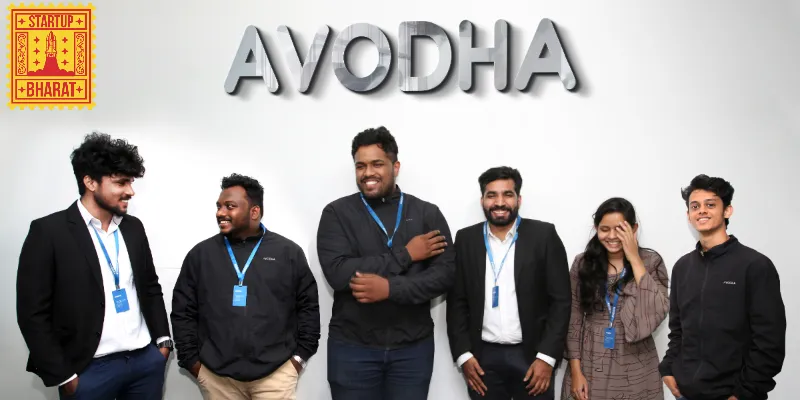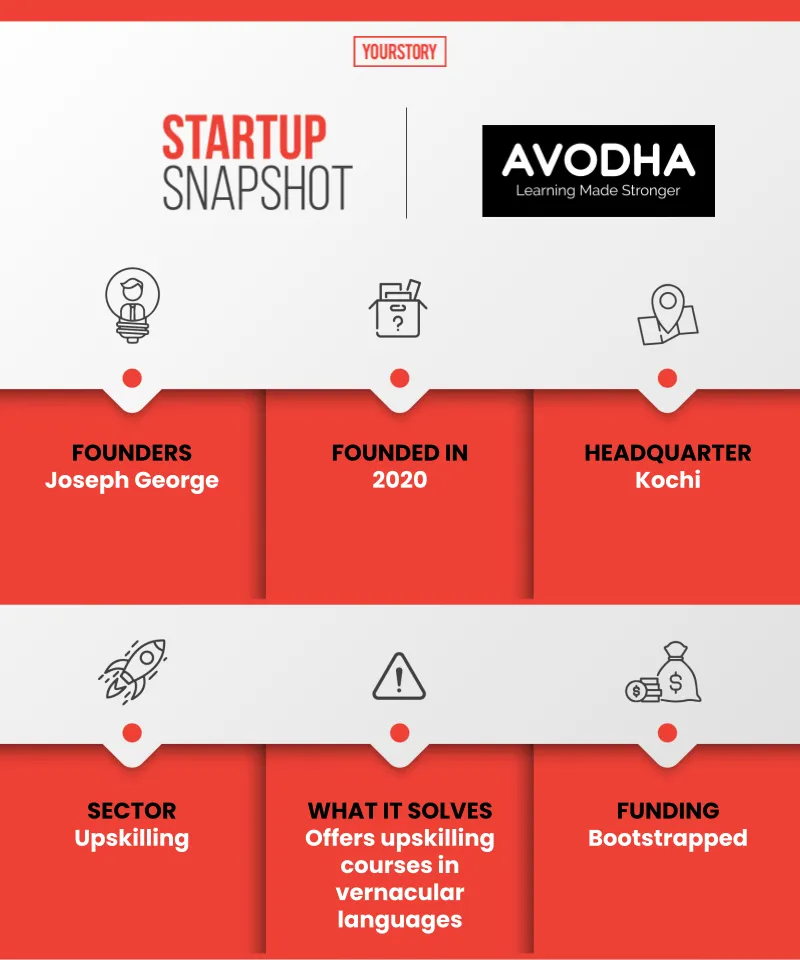[Startup Bharat] This Kochi startup is working to disrupt the vernacular upskilling market in India
Founded in 2020, Kochi-based Avodha is a vernacular upskilling platform that offers courses in coding, mobile mechanics, marketing, accounting, and more in Tamil and Malayalam.
Entrepreneur Joseph George learned coding through YouTube videos in order to build an open-source notes aggregator app, Vidya Education Application, during his second year of college.
During his process of learning, he realised that while he could upskill himself through online videos and courses, many couldn’t because of a language barrier - as most of this content is in English.
After understanding the online education market during his stint at Toppr, Joseph launched vernacular-language upskilling platform in 2020. Based out of Kochi, Avodha offers upskilling courses across several categories in regional languages.
“The vernacular skill development segment is underserved and that is what I am looking to solve with Avodha,” Joseph told YourStory.

Image Credit: Avodha
Addressing the vernacular market
Joseph says Avodha, currently offers 17 upskilling courses such as coding, mobile mechanics, marketing, and accounting among others in Tamil and Malayalam. The company is currently working to offer courses in English and Kannada as well.
Explaining the unusual name, the founder says that the startup has been named Avodha, which means skilled labour in Hebrew.
He clarified that students are free to switch courses according to their interests. “The course duration is generally three months but we have kept things flexible, allowing users to extend their course timing in case they need more time to completely grasp the course,” he said.
“All classes are pre-recorded and available through the website. Every course allows the students to live chat and get sessions with teachers to get their doubts clarified.”
The founder explained that the startup was now looking to provide content in Bangla, Marathi, Gujarati, and Hindi as well.
Apart from the upskilling courses, Avodha also has a job portal that helps students find and connect with appropriate job opportunities upon completion of the course. “We have placed 723 students placed with jobs since inception,” he said.
Joseph said initially he was a one-man army for Avodha - he built the platform, introduced the courses, gave lectures, and also took care of sales. But Avodha took off within the first few months, and the team now includes about 200 members.

Illustration: YS Design
Business and more
Speaking about the business model, the founder said users are required to pay Rs 2,800 for availing anyone of all the courses. If a student gets a job through the startup, they will be charged Rs 10,000 under an income-sharing model.
“We are currently in two states - Kerala and Tamil Nadu - and have clocked a total turnover of Rs 4.8 crore in the last eight months since inception,” Joseph said.
Avodha claims to have 20,000 paid users enrolled on the platform as of now; 7 percent of these are Indians living abroad.
“Within the next three years, we want to expand our presence in Africa, Eastern Europe, and the Middle East, which have high potential in the vernacular-language upskilling market,” Joseph said.
The bootstrapped startup was launched with an initial investment of Rs 3.5 lakh, and the founder is currently looking to raise its first round of funding to scale up business.
According to a McKinsey Global Survey on future workforce needs, nearly nine in 10 executives and managers revealed that their organisations either face skill gaps already or expect gaps to develop within the next five years.
The COVID-19-led acceleration in the edtech sector may also have played a major role in increasing demand for upskilling courses to meet future work needs.
Several players such as , , , and InterviewLabs, among others, are working in the upskilling segment, but not many are addressing vernacular needs. The only exception is Josh Skills, by , which offers courses in Hindi, Bangla, Punjabi, and Marathi.
However, Joseph believes that its core technology along with access to job openings and its competitive prices might set it apart from its competitors.
Edited by Teja Lele


![[Startup Bharat] This Kochi startup is working to disrupt the vernacular upskilling market in India](https://images.yourstory.com/cs/2/b094ec506da611eab285b7ee8106293d/imageonline-co-logoadded27-1618840381275.jpg?mode=crop&crop=faces&ar=2%3A1&format=auto&w=1920&q=75)
![[Startup Bharat] This 20-year-old suicide survivor’s mental health startup is preventing others from walking in his footsteps](https://images.yourstory.com/cs/2/f49f80307d7911eaa66f3b309d9a28f5/Hopeee-1618496230430.png?fm=png&auto=format&h=100&w=100&crop=entropy&fit=crop)
![[Startup Bharat] Patna-based Hanuman is working to ensure emergency healthcare reaches patients in time](https://images.yourstory.com/cs/2/b094ec506da611eab285b7ee8106293d/imageonline-co-logoadded25-1618384894963.jpg?fm=png&auto=format&h=100&w=100&crop=entropy&fit=crop)




